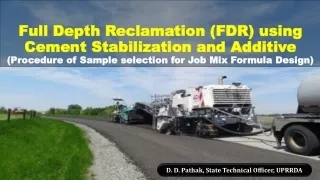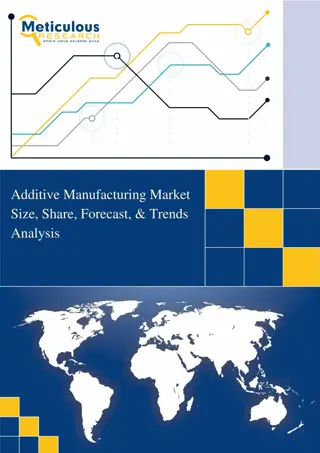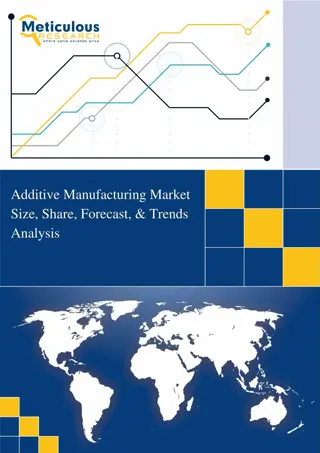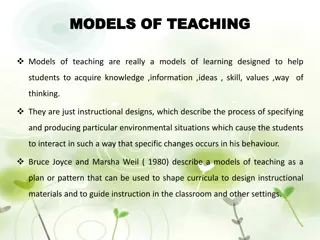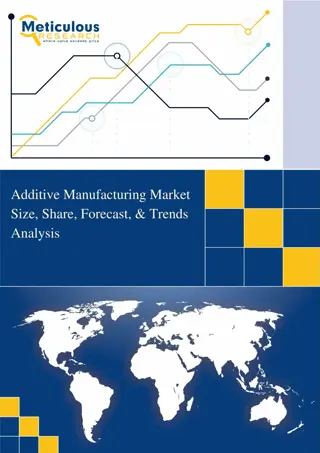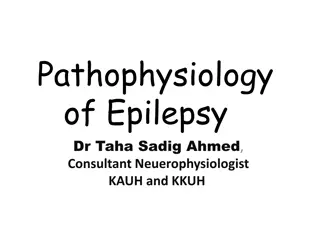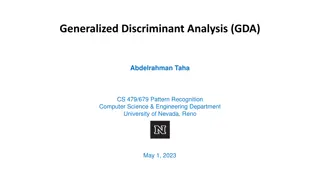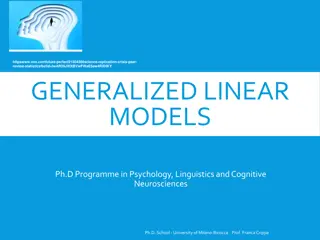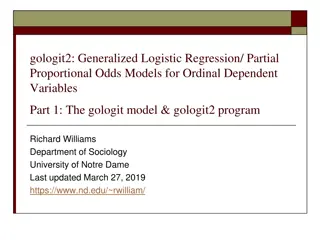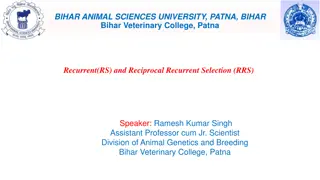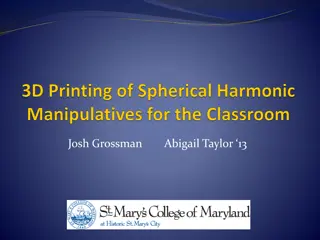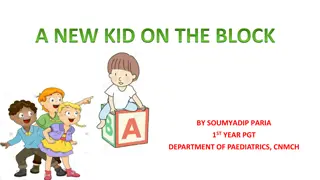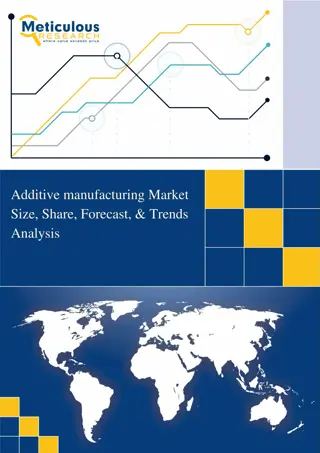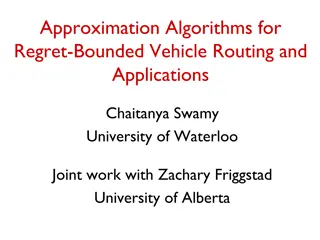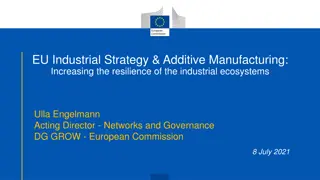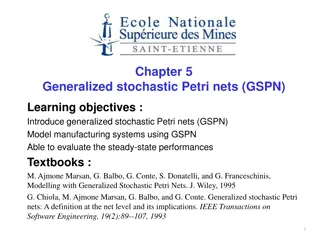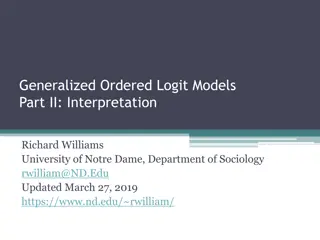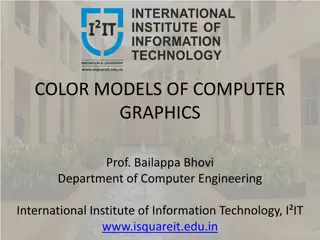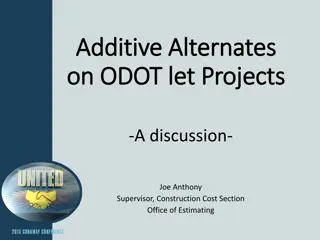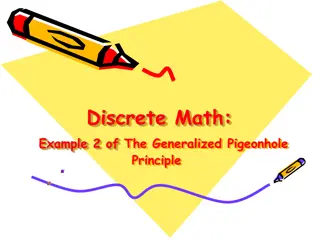Full Depth Reclamation (FDR) using Cement Stabilization and Additive
The procedure of selecting representative samples for the Job Mix Formula Design in Full Depth Reclamation (FDR) using Cement Stabilization and Additive. Understand the important principles and steps involved in sample collection.
6 views • 20 slides
Accelerating Additive Manufacturing Certification with Model-Based Tools
Mallory S. James, an Engineer at NASA Marshall Space Flight Center, explores qualification methodologies for AM spaceflight hardware. She focuses on model-based tools for accelerated AM certification and continuous process improvement. The IMQCAM Institute aims to innovate a model-centric workflow b
5 views • 16 slides
System Models in Software Engineering: A Comprehensive Overview
System models play a crucial role in software engineering, aiding in understanding system functionality and communicating with customers. They include context models, behavioural models, data models, object models, and more, each offering unique perspectives on the system. Different types of system
3 views • 33 slides
Generalized Additive Models
Generalized Additive Models (GAMs) provide a flexible and automatic statistical method for identifying and characterizing nonlinear regression effects. Unlike traditional linear models, GAMs can capture non-linear relationships between predictors and outcomes using unspecified smooth functions. By f
0 views • 52 slides
Additive Manufacturing Market
The growth of the additive manufacturing market is driven by the rising need to produce complex parts, reduce manufacturing expenses, and minimize waste, improvements in product development and supply chains, and easy customization and bulk production using additive manufacturing. However, the restr
1 views • 4 slides
Additive Manufacturing
additive manufacturing market is poised to soar to unprecedented heights, anticipated to burgeon to a monumental $228.8 billion by the year 2031, exhibiting a remarkable Compound Annual Growth Rate (CAGR) of 27.9% from 2024 to 2031.
1 views • 3 slides
Additive Manufacturing
the growing use of 3D printers to produce functional end-use parts and composite 3D printing is expected to offer significant growth opportunities for players operating in the additive manufacturing market.
1 views • 3 slides
Cryogenic Heated Tube Flow Boiling Experiments with Generalized Fluid System Simulation Program
Modeling of cryogenic heated tube flow boiling experiments of nitrogen and methane using the Generalized Fluid System Simulation Program. The research conducted by Michael Baldwin and co-authors from NASA MSFC, NASA GRC, and Purdue University explores the motivation, background, and findings related
0 views • 18 slides
Understanding Models of Teaching for Effective Learning
Models of teaching serve as instructional designs to facilitate students in acquiring knowledge, skills, and values by creating specific learning environments. Bruce Joyce and Marsha Weil classified teaching models into four families: Information Processing Models, Personal Models, Social Interactio
1 views • 28 slides
Additive Manufacturing
The growing use of 3D printers to produce functional end-use parts and composite 3D printing is expected to offer significant growth opportunities for players operating in the additive manufacturing market.
1 views • 3 slides
A Unified Approach to Interpreting Model Predictions
Unified methodology for interpreting model predictions through additive explanations and Shapley values. It discusses the relationship between Additive Explanations and LIME, introduces Shapley values, approximations, experiments, and extensions in model interpretation. The approach unifies various
1 views • 21 slides
Understanding the Pathophysiology of Epilepsy and Seizures
Epilepsy is a group of disorders characterized by recurrent, unprovoked seizures. Seizures are sudden surges of electrical activity in the brain that can cause alterations in sensation, behavior, or consciousness. They can be classified as partial or generalized based on their origin and clinical ma
2 views • 14 slides
Understanding Generalized Discriminant Analysis (GDA) in Pattern Recognition
Generalized Discriminant Analysis (GDA) is a nonlinear form of Linear Discriminant Analysis (LDA) that utilizes kernel methods to find discriminatory features for optimal class separability. LDA aims to maximize the between-class covariance matrix while minimizing the within-class covariance matrix.
2 views • 17 slides
Understanding Generalized Linear Models in Psychology and Statistics
Delve into the world of Generalized Linear Models (GLMs) in psychology and statistics with a focus on regression, model assumptions, parameter estimates, and model selection. Explore the application of GLMs in analyzing various types of data, including not normally distributed data, counts, and ordi
1 views • 67 slides
Grice's Theory of Implicature: Types, Properties, and Diagnostic Tests
Grice's theory of implicature distinguishes between types of implicatures - conventional and conversational. Conversational implicatures are context-dependent and motivated by conversational maxims, leading to generalized and particularized implicatures. Generalized conversational implicatures are d
0 views • 18 slides
Overview of gologit2: Generalized Logistic Regression Models for Ordinal Dependent Variables
gologit2 is an advanced program for estimating generalized logistic regression models, including proportional odds, generalized ordered logit, and partial proportional odds models. It offers features beyond traditional ologit, allowing for less restrictive and more parsimonious modeling of ordinal d
0 views • 27 slides
Understanding Selection Strategies in Animal Genetics and Breeding
Genes influence traits through Additive Gene Action (AGA) and Non-Additive Gene Action (NAGA) in animal breeding. Recurrent Selection (RS) and Reciprocal Recurrent Selection (RRS) play crucial roles in improving animals. Selection for General Combining Ability (GCA) and Specific Combining Ability (S
0 views • 16 slides
Understanding Nonelectrolytes in Solutions
Physical properties of substances are classified into colligative, additive, and constitutive properties. Colligative properties depend on the number of particles in a solution and are similar for different nonelectrolytes. Additive properties are based on the total contribution of atoms, while cons
1 views • 14 slides
Understanding Rational Numbers: A Comprehensive Overview
Discover the world of numbers with this comprehensive guide on different types of numbers, focusing on rational numbers. Learn about natural numbers, whole numbers, integers, and how rational numbers are represented on a number line. Dive into the properties of rational numbers and explore the conce
2 views • 19 slides
Nottingham's Number Fluency Project - Ten-Frame Visualisation for Additive Facts
Explore the Nottinghams Number Fluency Project's innovative method of teaching additive facts using ten-frame visualizations. From basic additions like 1 + 1 = 2 to more complex sums, this project provides engaging visual aids to enhance number fluency and mathematical understanding.
0 views • 92 slides
Exploring Generalized Regression Models in Functional Data Analysis
Dive into the world of Generalized Regression models with Genreg in JMP Pro, a versatile platform for handling various response types like skewed, censored, and non-numeric data. Learn how Genreg can offer flexibility in model building beyond traditional linear regression, accommodating unique respo
0 views • 9 slides
Understanding Generalized Heat Engines and Carnot Cycle
Generalized heat engines can be reversible or irreversible, with Carnot engines playing a crucial role in maximizing efficiency. By analyzing the heat absorption and rejection processes, we explore the impact of multiple tiny Carnot engines working together and the overall effect on the main general
0 views • 14 slides
Exploring Additive Manufacturing: A Revolutionary Technology
Additive manufacturing, commonly known as 3D printing, has witnessed significant advancements since its inception in the 1980s. This technology allows for the creation of three-dimensional objects through various processes like extrusion, binding, and polymerization. With the rise of accessible 3D p
3 views • 14 slides
Additive Combinatorics Approach to Log-Rank Conjecture in Communication Complexity
This research explores an additive combinatorics approach to the log-rank conjecture in communication complexity, addressing the maximum total bits sent on worst-case inputs and known bounds. It discusses the Polynomial Freiman-Ruzsa Conjecture and Approximate Duality, highlighting technical contrib
0 views • 9 slides
Case Study: A New Kid on the Block - Pediatric Presentation
An 11-year-old girl presented with a four-month history of fever, three months of generalized weakness and body ache, and a recent weight loss. Physical examination revealed pallor, edema, generalized tenderness, lymphadenopathy, and telangiectatic rash. Vitals showed elevated respiratory and heart
0 views • 27 slides
additive manufacturing
Additive manufacturing also enables the digital storage and on-demand production of spare parts, reducing the need for extensive inventory storage and ensuring the availability of parts for older or low-volume products.
1 views • 4 slides
Understanding Additive Angle Measures
In this lesson on additive angle measures, students learn how to find missing angle measures when two non-overlapping angles combine to form a larger angle. Essential questions are posed, and students are guided through solving problems involving angle decomposition and measurement. Practical activi
0 views • 46 slides
Regret-Bounded Vehicle Routing Approximation Algorithms
Regret-bounded vehicle routing problems aim to minimize client delays by considering client-centric views and bounded client regret measures. This involves measuring waiting times relative to shortest-path distances from the starting depot. Additive and multiplicative regret measures are used to add
0 views • 28 slides
European Union Industrial Strategy and Additive Manufacturing
The EU's industrial strategy focuses on enhancing the resilience of industrial ecosystems through additive manufacturing. The manufacturing industry in Europe is a vital driver of employment, innovation, and prosperity. Despite being a front runner in metal and hybrid 3D printing, the EU faces chall
0 views • 6 slides
Enhancing Engine Performance with Nano-additive in Oil: A Study on Heat Transfer
Investigate the impact of mixing nano-additive with engine oil on heat transfer performance in a study conducted by Team 8. The project aims to design a radiator and oil-coolant system for a spark ignition engine, exploring the benefits of using nano-particles in enhancing heat transfer rates. Addre
0 views • 27 slides
Innovative Modeling and Monitoring in Additive Manufacturing at MOEMS Laboratory
Distinguished Professor Yu-Lung Lo from National Cheng Kung University's Department of Mechanical Engineering leads research on modeling and process monitoring for additive manufacturing. The laboratory focuses on challenges such as electron beam acceleration, simulation models, and optimal paramete
0 views • 15 slides
Approximation Algorithms for Regret-Bounded Vehicle Routing
This research explores regret-bounded vehicle routing problems (VRPs) where the focus is on minimizing client delays based on their distances from the starting depot. The study introduces a client-centric view to measure regret and devises algorithms for both additive and multiplicative regret-based
0 views • 23 slides
Understanding Negative Numbers and Additive Inverse
Explore the world of negative numbers and additive inverse through a series of mathematical exercises. Learn how to calculate sums involving negatives and discover the concept of additive inverses, where adding a number and its opposite results in zero. Test your understanding with various numerical
0 views • 21 slides
Introduction to Generalized Stochastic Petri Nets (GSPN) in Manufacturing Systems
Explore Generalized Stochastic Petri Nets (GSPN) to model manufacturing systems and evaluate steady-state performances. Learn about stochastic Petri nets, inhibitors, priorities, and their applications through examples. Delve into models of unreliable machines, productions systems with priorities, a
0 views • 44 slides
Understanding Violations of Proportional Odds Assumption in Generalized Ordered Logit Models
The article discusses violations of the proportional odds assumption in generalized ordered logit models. It provides examples of when assumptions are not violated and when they are partially violated, illustrating how gender impacts attitudes. Model illustrations and analysis showcase the implicati
0 views • 28 slides
Side Channel Monitoring in Additive Manufacturing for Cybersecurity and Quality Assurance
Side channel monitoring is crucial in the field of additive manufacturing to bridge cybersecurity and quality assurance. This process involves detecting physical domain data leakage through various side channels like acoustics, thermal, laser, vibration, electric current, optical, and pressure. By m
0 views • 10 slides
Overview of Color Models in Computer Graphics
Color models in computer graphics play a crucial role in creating a wide range of colors using a limited set of primary colors. There are two main types of color models - additive and subtractive, with RGB being common for displays and CMYK for printing. RGB is additive, combining red, green, and bl
0 views • 16 slides
Understanding Additive Alternates in ODOT Contracts
Exploring the role of Additive Alternates in ODOT construction projects, including why they are essential, how they are set up, awarded, and considerations for the future. Additive Alternates provide flexibility in project funding and scope, allowing owners to add extra work within budget constraint
0 views • 8 slides
Understanding the Generalized Pigeonhole Principle in Discrete Math
The Generalized Pigeonhole Principle is illustrated through an example involving selecting cards from a deck. By strategically grouping the cards, we determine the minimum number needed to guarantee at least three cards of the same suit are chosen. Additionally, the process is applied to finding the
1 views • 5 slides
Understanding Anxiety Disorders and Stress Management
Anxiety disorders, such as Generalized Anxiety Disorder and Panic Disorder, are common in medical settings and often coexist with various medical conditions. Patients with anxiety may also experience somatic symptoms like heart palpitations and sleep disturbances. The DSM-5 criteria for Generalized
0 views • 17 slides
